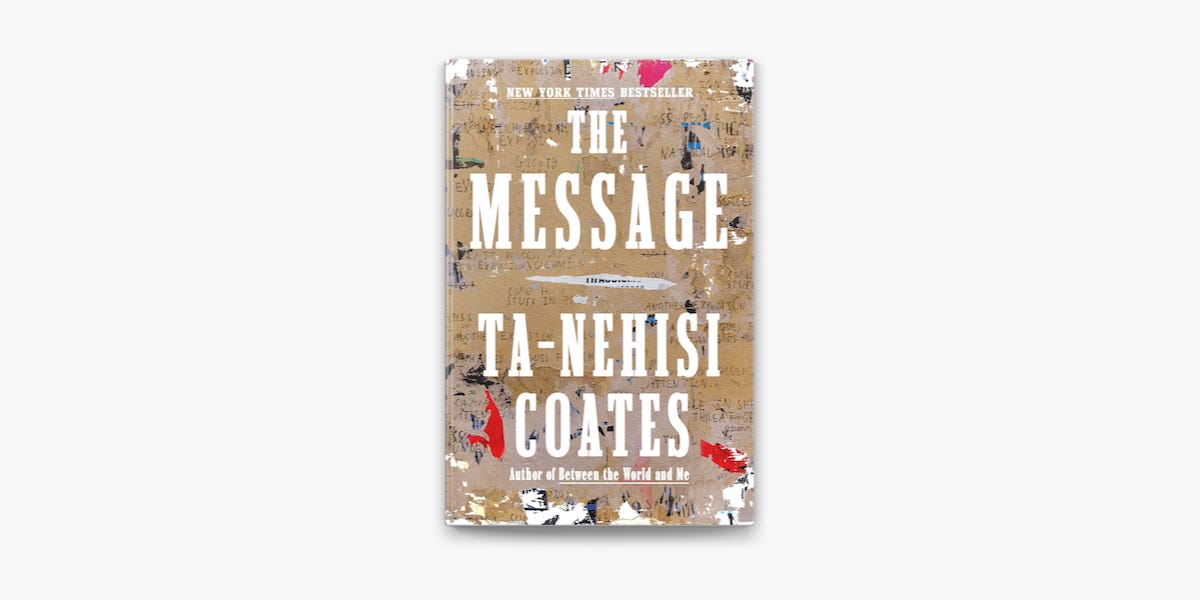The narratives that shape our politics: with Ta-Nehisi Coates, Edward Said, Theodor Herzl, and Joe Biden
On empire and the subconscious.
Friends—
Forgive me, as I can’t shake the weight of our collective indifference to Gaza’s ongoing suffering, nor the support it receives from our governments in the U.S. and Europe. The numbers are staggering: 30% of Israel's imported weapons come from German companies, and 69% from the United States. We aren’t bystanders. We’re enablers.
Just last week, another report concluded that Israel’s actions in Gaza are “consistent with the characteristics of genocide.” This is not the first such assessment, nor will it be the last. Yet our governments remain unmoved, with the US calling the claim ‘unfounded.’
“Every single empire in its official discourse has said that it is not like all the others.”
In a previous episode of the European, I suggested that beneath the indifference lies a fear, as history shows that humanity has repeatedly attempted to eradicate entire populations. It’s a truth so horrifying that ignoring it feels easier than facing it. Reading Ta-Nehisi Coates’ recent book, The Message, reminded me of another likely reason—mere opportunism, racism even—as we see Coates quoting Edward Said’s Orientalism:
“Every single empire in its official discourse has said that it is not like all the others. That its circumstances are special, that it has a mission to enlighten, civilize, bring order and democracy... And, sadder still, there always is a chorus of willing intellectuals to say calming words about benign or altruistic empires, as if one shouldn’t trust the evidence of one’s eyes watching the destruction, misery, and death brought by the latest mission civilizatrice.”
Coates’ work explores how the stories we tell—and those we suppress—shape our realities. He examines the writings of early Zionist leaders, such as Theodor Herzl, who, when he turned his focus to Palestine for a Jewish homeland, framed Palestinians as “part of the scenery”, and described Israel as “a rampart of Europe against Asia”—“an outpost of civilization against barbarism.”
The story of a civilized West combating barbarism is deeply rooted, with its archetypal symbols resonating in our collective subconscious. These ideas shape our behavior, often without us even realizing it. Skilled rhetoricians understand this dynamic well. We see it echoed in Netanyahu’s framing of the war on Gaza as “a struggle between the children of light and the children of darkness, between humanity and the law of the jungle.”
“Herzl framed them as savage, proposing Israel as ‘a rampart of Europe against Asia,’ an ‘outpost of civilization against barbarism’.”
This symbolism doesn’t just influence our thinking—it creates a feedback loop. The stories we tell feed our subconscious, and our subconscious, in turn, crafts narratives to justify our actions. It’s a perpetuum mobile. Occasionally, though, the veil slips, and the raw opportunism driving these narratives is exposed.
Take Joe Biden’s infamous 1986 Senate speech, where he defended military aid to Israel as “the best $3 billion investment America makes.” Biden argued that Israel was indispensable to U.S. strategic interests. Without it, he claimed, America would have to “invent an Israel” to secure its objectives in the Middle East.
“The stories we tell feed our subconscious, and our subconscious, in turn, crafts narratives to justify our actions.”
These moments expose how deeply these narratives are intertwined with the pursuit of power—less about defending civilization and more about justifying self-interest. They not only blind us to the barbarism of others but also absolve us of our own complicity.
If defending civilization were truly our goal, we would not stand by as thousands, including children, are slaughtered—funded by our tax money, and under the pretense of a war against terror. Genuine civilization is not built on double standards but rests on an unflinching commitment to human dignity. Achieving it demands that we confront these narratives—not only in the world around us but within ourselves.
Photo by Robert Bye on Unsplash
Notes and further reading:
The numbers are staggering: 30% of Israel's imported weapons come from German companies, and 69% from the United States. (Deutsche Welle)
Just last week, another report concluded that Israeli policies and practices in Gaza are “consistent with the characteristics of genocide.” (UN Special Committee to Investigate Israeli Practices Affecting the Human Rights of the Palestinian People and Other Arabs of the Occupied Territories)
Yet our governments remain unmoved, with the US calling the claim ‘unfounded’. (The Guardian)
In a previous episode of the European I suggested that beneath the indifference lies a fear. (The European on Substack)
Reading Ta-Nehisi Coates’ recent book The Message reminded me of another likely reason. (Ta-Nehisi Coates)
We see it echoed in Netanyahu’s framing of the war on Gaza as “a struggle between the children of light and the children of darkness, between humanity and the law of the jungle.” (Business Insider, and other sources —Netanyahu later deleted this tweet.)
“funded by our tax money” (Al Jazeera Opinion, referencing research by Transnational Institute)







